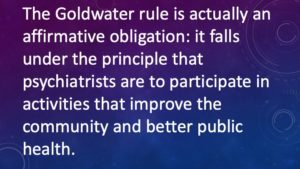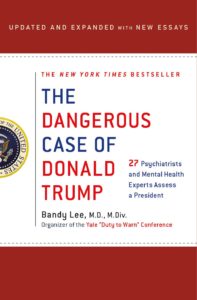by Bandy X. Lee M.D., M.Div., Edwin B. Fisher Ph.D., and Leonard L. Glass M.D., M.P.H.
In the spring, we assessed the Mueller report from a mental health perspective because of the wealth and quality of content that rendered it useful for a capacity evaluation of the president. We concluded that the president fell short of every metric for rational, considered decision making capacity. As more than a thousand former federal prosecutors came forth with an opinion that Trump would have been charged if he were not president, hundreds of mental health professionals have endorsed our assessment.
Most mental health professionals would acknowledge that much of this was clear since the beginning of this presidency if not before, and certainly our book, “The Dangerous Case of Donald Trump”, predicted how this presidency would unfold dangerously and destructively at multiple levels. There was a near-consensus from the start, that behavior is not random, and especially dangerous behavior is often recurrent. Hence, very little of the domestic terrorism, global instability, and even destruction of our institutions has come as a surprise to mental health experts. This begs the question of what the American Psychiatric Association’s response has been.
In a word, the American Psychiatric Association failed in its leadership duty when it acted to gag mental health professionals and led the public to a misunderstanding of our role. In the early phase of Mr. Trump’s presidency, few would have questioned consulting mental health experts about mental health issues, and as the president’s issues became glaring, the public looked to the mental health field. Psychiatrists also expected their own professional organization to represent or at lease allow the expression of their concerns. Instead, the American Psychiatric Association did the opposite: it radically expanded the so-called “Goldwater rule” and went on a public campaign to silence the entire field, even those of us who were not diagnosing.
 What it failed to clarify is that the Goldwater rule is actually an affirmative obligation: it falls under the principle that psychiatrists are to participate in activities that improve the community and better public health. When we are asked about a public figure, we are encouraged to educate the public while refraining from diagnosis. The Association inflated the second part of that so as to suppress the first, the part about educating the public. By expanding the “do not diagnose” part to commanding “do not mention any objective observation of any public figure you have not assessed face-to-face,” it sought to require that mental health professionals abandon that central principle of the Goldwater rule itself—to improve the community and better public health by providing expert perspective on a confusing personality at the helm of government, just when the public was hungry for it. Instead of encouraging discourse, it has promulgated a silencing mandate.
What it failed to clarify is that the Goldwater rule is actually an affirmative obligation: it falls under the principle that psychiatrists are to participate in activities that improve the community and better public health. When we are asked about a public figure, we are encouraged to educate the public while refraining from diagnosis. The Association inflated the second part of that so as to suppress the first, the part about educating the public. By expanding the “do not diagnose” part to commanding “do not mention any objective observation of any public figure you have not assessed face-to-face,” it sought to require that mental health professionals abandon that central principle of the Goldwater rule itself—to improve the community and better public health by providing expert perspective on a confusing personality at the helm of government, just when the public was hungry for it. Instead of encouraging discourse, it has promulgated a silencing mandate.
This serious error confuses clinical psychiatry with preventive psychiatry, which is a branch of public health. Clinical psychiatry treats individual patients, while public health deals with entire populations. There is no individual patient where a public figure is concerned, and our calling for proper management for the protection of public safety is not “armchair psychiatry” or “the use of psychiatry as a political tool,” as the APA’s leadership has claimed in statements of the Association, but the practice of public health. Equating everything we do with clinical psychiatry truncates our ability to fulfill what the APA’s own code of ethics states as our “responsibility to patients … as well as to society”.
Ethical rules require careful deliberation of complex situations, engaging one’s moral agency. Yet, the APA’s reinterpretation of the Goldwater rule, soon after Donald Trump’s inauguration, prohibited any comment of any kind on a public figure, under any circumstance, without exception—even in a national emergency. In our view, not only did this hamper our ability to fulfill our public health obligations, but it deprived the public of critical information at a critical time and left the nation in the dark as it had to confront the frightening situation of having a mentally unstable president. One of us (Lee) resigned from the APA 12 years ago because of its excessive reliance on pharmaceutical industry support, after which its emphasis seemed to shift from patient advocacy to promotion of chemical therapy. Another of us (Glass) did so more recently since being told he could not speak about the current president under the new interpretation of the rule, which a high-ranking officer admitted was linked to protecting its federal funding. Constitutional scholars have noted the difficulty of identifying a potential need for intervention without education from mental health professionals about the nature of mental incapacity, which can be made more difficult to discern when masterful manipulative skills coexist to obscure that incapacity.

Furthermore, the APA refused to reopen discussion despite numerous attempts on the part of many professionals and professional groups, its own membership’s protests and resignations, Goldwater rule scholars’ request to form a commission to reexamine the rule, and even our own consensus proposal for revision of the rule. The APA stood intransigent in spite of an informal poll showing that a large majority of psychiatrists believe the Goldwater rule should be modified (the APA has not done any poll).
By propagating popular misconceptions that mental health is different from other health fields, that it is a taboo area never to be spoken about—implicitly suggesting that talk of psychopathology is intrinsically denigrating—the APA has stigmatized the entire field. Above all, by promulgating ignorance, which is the source of stigma, it deprived our society of the professional perspective capable of clarifying the dangerous dynamic that has been playing out. However, its role goes further. Suppressing professionals, scholars, and experts of various fields is a familiar theme in the history of oppressive governments. Often this suppression has recruited the cooperation of leaders of the very groups to be suppressed. The APA’s suppression of all discussion of the president’s psychology, dangerousness, and public health threat—all without a diagnosis—can best be seen in this dishonorable and destructive tradition of tyranny.
The views expressed by Bandy X. Lee, Edwin B. Fisher, and Leonard L. Glass are solely their own. This post reflects the views of the authors and not necessarily those of bioethics.net, the American Journal of Bioethics, or their staffs.